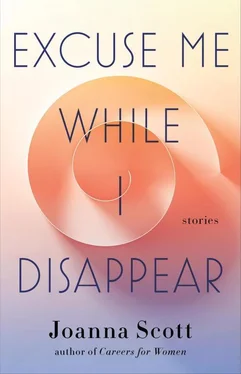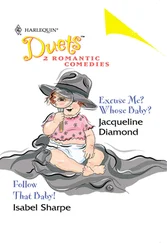Along the slopes of the foothills in the distance, the forest is interrupted by bald patches of limestone. Soon the creek disappears beneath the rocky ground. The stench of sulfur in the air grows stronger. Natural limestone cones, wrapped in velvety moss at their base, striated with yellow and tipped in crimson, look as if they’ve been molded by human hands. From the distance, a strange rattling sound can be heard. Bridger is reminded distinctly of wagon wheels turning along a gravel trail, though of course there are neither wagons nor trails for hundreds of miles. As he draws closer to the sound, the rotten stench intensifies. Empty craters pock the earth. The air becomes hot and misty, and Bridger feels a rumbling sensation beneath his feet.
Being by nature a man who always has to see what is around the next corner, no matter the peril involved, he presses forward between the limestone formations. He finds himself supported by a rim of rock as thin and transparent as ice. A cloud of hot steam spews from a crevice in the basalt wall.
Is this the entrance to the underworld? Even Jim Bridger knows better than to try to find out. He decides to call the hot spring Hell’s Broth, a name that is destined to be replaced since Jim Bridger, being illiterate, never writes it down.
With so many natural wonders to discover, how can a lone explorer keep track of them all? He has a good, reliable map in his mind and so will be able to guide future visitors, but that is of secondary importance. His primary motive is to see what has never been seen before. And since he can’t go to the moon, he is drawn to this unexplored corner of the western wilderness, where not even the indigenous tribes dare to go.
It is his first time in the corner of the wilderness that we will come to call Yellowstone. He has been traveling alone for two months by now. It will take him another ten days to cross the hills and ascend the ridge that bounds the valley on the north. He has left the herds of bison far behind. He survives on trout he catches by hook and line and a rabbit he nearly steps on in a clump of wheatgrass. He tracks a mule deer to the shore of a small lake but loses it when a strong whirlwind blows dust into his eyes. The deer runs off, zigzagging down the precipitous slope before Bridger can shoot.
He camps near the lake, which he names Lake of the Wind. Despite his empty stomach, he sleeps deeply. When he wakes the next morning, the water is covered with a thin layer of wrinkled ice, and a feathery snow is falling.
Bridger understands that he is running out of time—he has to reach the mining camp at Cooke City before the snow makes the terrain impassable. Still, he relishes the mix of fresh coolness and the warm currents of sunshine that break through the clouds. He walks briskly, humming the tune of a song whose words he’s forgotten but that still makes him feel cheerful. Distracted by the sound of his own voice, he fails to pay attention to his surroundings and does not notice how the landscape is changing until the song has ended.
He looks around him. The rock formations have darkened from a sandy brown to a smooth black that sparkles in the sunlight. Ahead, within the short distance of a stone’s throw, stands a magnificent elk. The elk holds its head so high its antlers threaten to poke holes in the blue dome of the sky. The animal stares straight at Bridger, unafraid. Bridger takes aim and fires. The shot and its ricochet echo in the silence. The animal does not move. Bridger looks around instinctually to make sure no one is present to laugh at him for his poor aim. He is glad that his reputation for expert marksmanship will remain unsullied. He fires again, with renewed confidence, but again the bullet goes astray. How can it be? The elk stands unperturbed even when Bridger moves toward it. One step further and Bridger will be close enough to reach out and grab the animal by an antler and might have done so if his fist hadn’t banged hard into a translucent wall.
He runs his fingers over the surface. The barrier, as high as a four-story building, has the texture of obsidian but the transparency of glass. Either it is some sort of immense igneous protrusion that crystallized eons ago, or the air itself has congealed and hardened.
Jim Bridger stares in wonder at the wall. He walks in a daze, dragging his hand along the glassy surface until he finds a break that forms a narrow archway. He tells himself that if Hell’s Broth was the entrance to the underworld, here is surely Heaven’s Door, left open for his convenience.
He slips through, leaving reality behind. On the other side, he knows immediately that he must change the way he thinks in order to make sense of something that has no precedent. His capacity for disbelief is as suspended as the motionless cascade that spills like sculpted ice from a precipice into a river that does not flow. Stalks of oatgrass do not waver in the wind. Violet capsules of a larkspur remain half-open, stopped in midbloom. Two bear cubs are caught in the midst of their playful wrestle for all eternity. A raven overhead hovers with its wings spread, held in midair in motionless flight. The elk Jim Bridger tried to shoot stands as still as a stuffed trophy. Across the valley, between the wall and the opposite ridge, nothing moves, nothing breathes, yet nothing has decayed. The sun and moon shine simultaneously, with petrified light.
* * *
Did this really happen? Does this place exist? I’m not sure. During the many expeditions he went on to lead across Yellowstone, Jim Bridger liked to tell the kinds of stories that no one believed. Still, he went on telling, he couldn’t help himself, and the hunters and mapmakers and thrill-seekers sitting around campfires went on listening. I’m guessing that Bridger added some embellishments with each retelling. My hunch is that he lost track of the difference between what had actually happened and what he’d made up for fun. His friends labeled him a teller of yarns, his critics called him a liar. It was understood that any newspaper editor who printed Bridger’s far-fetched tales would be laughed out of town. When one impatient woman asked him why he insisted on saying things that weren’t true, he replied, There’s no harm in fooling people who pump me for stories and don’t even say thank ye.
Do you blame him? What if you were alone in the uncharted wilderness, and you found yourself in the same place where Jim Bridger arrived that September day in 1830? What if you passed through an opening in a glass wall and arrived in a corner of the world where time had stopped? Would you wonder, as Bridger did, if you were hallucinating, and then conclude, as he did, that you were very much alert? Would you then decide, as the awestruck Jim Bridger did, that the valley you’ve stumbled into was not meant for mortal eyes and so must stay hidden from the rest of humanity? Would you go on to tell everyone you meet about this sacred place and yet refuse to reveal its actual location, bypassing it with wide detours on your subsequent journeys across Yellowstone? If you saw what Bridger saw that day, and if later you were asked to describe what you saw, would you care whether or not the story you ended up telling was perceived as the truth?
Principles of Uncertainty
She Sings…
… a la rueda, rueda, her voice too soft for the other passengers to hear, yet loud enough to soothe her sweet baby.
She sings, Dame un besito, y vete para la escuela, while the subway train whirs along the tracks and the tunnel lights flicker past.
She sings, Si no quieres ir, the vibrations of air felt all the way through the quilted denim of the sling pouch, and Acuéstate a dormir, before pursing her lips in preparation for planting a delicious kiss—proof that there is no one she loves more in the world than her chica, and no one her chica loves more than her mamasita .
Читать дальше












